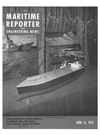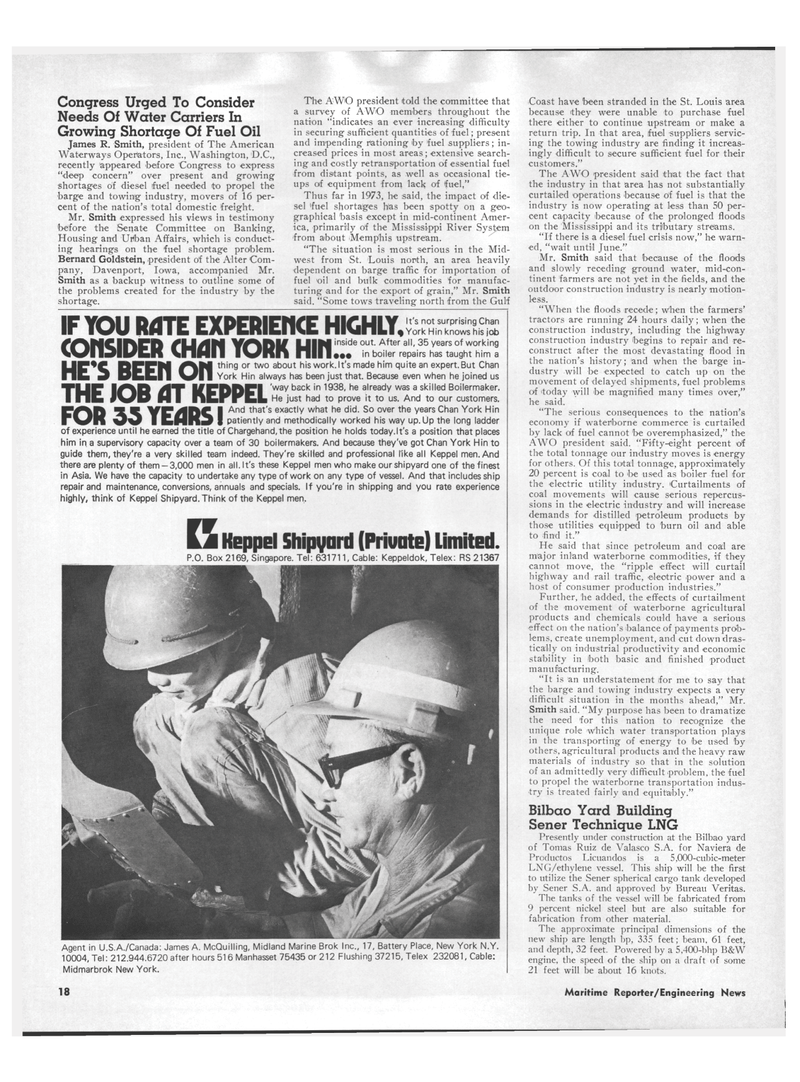
Page 16: of Maritime Reporter Magazine (June 15, 1973)
Read this page in Pdf, Flash or Html5 edition of June 15, 1973 Maritime Reporter Magazine
Congress Urged To Consider
Needs Of Water Carriers In
Growing Shortage Of Fuel Oil
James R. Smith, president of The American
Waterways Operators, Inc., Washington, D.C., recently appeared before Congress to express "deep concern" over present and growing shortages of diesel fuel needed to propel the barge and towing industry, movers of 16 per- cent of the nation's total domestic freight.
Mr. Smith expressed his views in testimony before the Senate Committee on Banking,
Housing and Urfban Affairs, which is conduct- ing hearings on the fuel shortage problem.
Bernard Goldstein, president of the Alter 'Com- pany, Davenport, Iowa, accompanied Mr.
Smith as a backup witness to outline some of the problems created for the industry by the shortage.
The AWO president told the committee that a survey of A WO members throughout the nation "indicates an ever increasing difficulty in securing sufficient quantities of fuel; present and impending rationing by fuel suppliers ; in- creased prices in most areas; extensive search- ing and costly retransportation of essential fuel from distant points, as well as occasional tie- ups of equipment from lack of fuel,"
Thus far in 1973, he said, the impact of die- sel 'fuel shortages has been spotty on a geo- graphical basis except in mid-continent Amer- ica, primarily of the Mississippi River System from about Memphis upstream. "The situation is most serious in the Mid- west from St. Louis north, an area heavily dependent on barge traffic for importation of fuel oil and bulk commodities for manufac- turing and for the export of grain," Mr. Smith said. "Some tows traveling north from the Gulf
Coast have been stranded in the St. Louis area because they were unable to purchase fuel there either to continue upstream or make a return trip. In that area, fuel 'suppliers servic- ing the towing industry are finding it increas- ingly difficult to secure sufficient fuel for their customers."
The AWO president said that the fact that the industry in that 'area has not substantially curtailed operations because o'f fuel is that the industry is now operating at less than 50 per- cent capacity because of the prolonged floods on the Mississippi and its tributary streams. "If there is a diesel fuel crisis now," he warn- ed, "wait until June."
Mr, Smith said that because of the floods and slowly receding ground water, mid-con- tinent farmers are not yet in the fields, and the outdoor construction industry is nearly motion- less. "When the floods recede; when the farmers' tractors are running 24 hours daily; when the construction industry, including the highway construction industry begins to repair and re- construct after the most devastating flood in the nation's history; and when the barge in- dustry will be expected to catch up on the movement of delayed shipments, fuel problems of today will be magnified many times over," he said. "The serious consequences to the nation's economy if waterborne commerce is curtailed by lack of fuel cannot 'be overemphasized," the
AWO president said. "Fifty-eight percent of the total tonnage our industry moves is energy for others. Of this total tonnage, approximately 20 percent is coal to 'be used as boiler fuel for the electric utility industry. Curtailments of coal movements will cause serious repercus- sions in the electric industry and will increase demands for distilled petroleum products by those utilities equipped to burn oil and able to find it."
He said that since petroleum and coal are major inland waterborne commodities, if they cannot move, the "ripple effect will curtail highway and rail traffic, electric power and a host of consumer production industries."
Further, he added, the effects of curtailment of the movement of waterborne agricultural products and chemicals could have a serious effect on the nation's balance of payments prob- lems, create unemployment, and cut down dras- tically on industrial productivity and economic stability in both basic and finished product manufacturing. "It is an understatement for me to say that the barge and towing industry expects a very difficult situation in the months ahead," Mr.
Smith said. "My purpose has been to dramatize the need for this nation to recognize the unique role which water transportation plays in the transporting of energy to be used by others, agricultural products and the heavy raw materials of industry so that in the solution
Of an admittedly very difficult problem, the fuel to propel the waterborne transportation indus- try is treated fairly and equitably."
Bilbao Yard Building
Sener Technigue LNG
Presently under construction at the Bilbao yard of Tonias Ruiz de Valasco S.A. for Naviera de
Productos Licuandos is a 5,000-cubic-meter
LNG/ethylene vessel. This ship will be the first to utilize the Sener spherical cargo tank developed by Sener S.A. and approved by Bureau Veritas.
The tanks of the vessel will be fabricated from 9 percent nickel steel but are also suitable for fabrication from other material.
The approximate principal dimensions of the new ship are length bp, 335 feet; beam, 61 feet, and depth, 32 feet. Powered by a 5,400-bhp B&W engine, the speed of the ship on a draft of some 21 feet will be about 16 knots.
York Hin knows his job inside out. After all, 35 years of working in boiler repairs has taught him a •••
IF YOU MTE EXPERIENCE HIGHLY, CONSIDER CH4N YORK HIN
QPPli thing or two about his work. It's made him quite an expert. But Chan i^E DEMI York Hin always has been just that. Because even when he joined us TUF ISNQ /IT IfCBBCI 'way back in 1938, he already was a skilled Boilermaker.
I nt IvD H I llkr rCL He just had to prove it to us. And to our customers. •• V YIT/IDO I Ancl that s exactly what he did. So over the years Chan York Hin rV/K WW I bHllv I patiently and methodically worked his way up. Up the long ladder of experience until he earned the title of Chargehand.the position he holds today. It's a position that places him in a supervisory capacity over a team of 30 boilermakers. And because they've got Chan York Hin to guide them, they're a very skilled team indeed. They're skilled and professional like all Keppel men. And there are plenty of them — 3,000 men in all. It's these Keppel men who make our shipyard one of the finest in Asia. We have the capacity to undertake any type of work on any type of vessel. And that includes ship repair and maintenance, conversions, annuals and specials. If you're in shipping and you rate experience highly, think of Keppel Shipyard. Think of the Keppel men. a Keppel Shipyard (Private) limited.
P.O. Box 2169, Singapore. Tel: 631711, Cable: Keppeldok, Telex: RS 21367
Agent in U.S.A./Canada: James A. McQuilling, Midland Marine Brok Inc., 17, Battery Place, New York N.Y. 10004, Tel: 212.944.6720 after hours 516 Manhasset 75435 or 212 Flushing 37215, Telex 232081, Cable:
Midmarbrok New York. 18 Maritime Reporter/Engineering News

 15
15

 17
17
